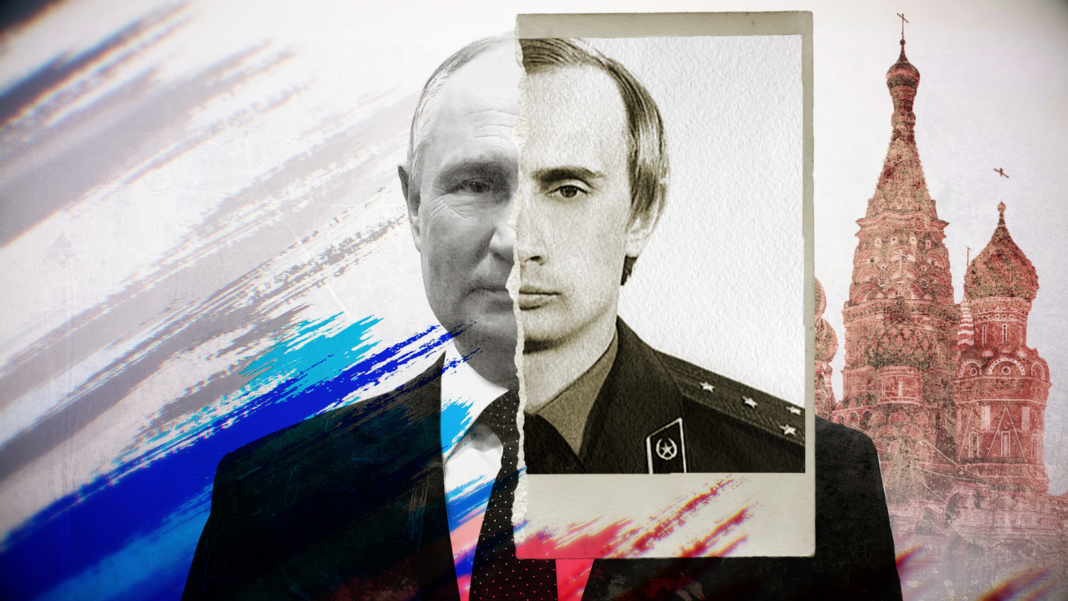From working as a KGB agent in Soviet East Germany to the very heights of the Kremlin, the history of the Russian Federation is in many ways inseparable from that of Vladimir Putin.
As he eyes another term as president in the 2024 elections, Sky News takes a look back at his long reign – and some of the events that threatened his grip on power.
Growing up in the shadow of the Nazi siege of Leningrad
Vladimir Vladimirovich Putin was born in the Soviet City of Leningrad on 7 October 1952.
He had two brothers who died before he was born – his brother Viktor lost his life as Nazi forces laid siege to Leningrad during the Second World War.
Later in his life, Mr Putin recounted that his grandfather Spiridon Putin worked as a cook for Soviet leaders Vladimir Lenin and Joseph Stalin.
Mr Putin grew up in Leningrad (modern-day St Petersburg) where he trained in martial arts and studied law at university.
Young Vladimir Putin. Pic: Russian Archives/Zuma Wire/Shutterstock
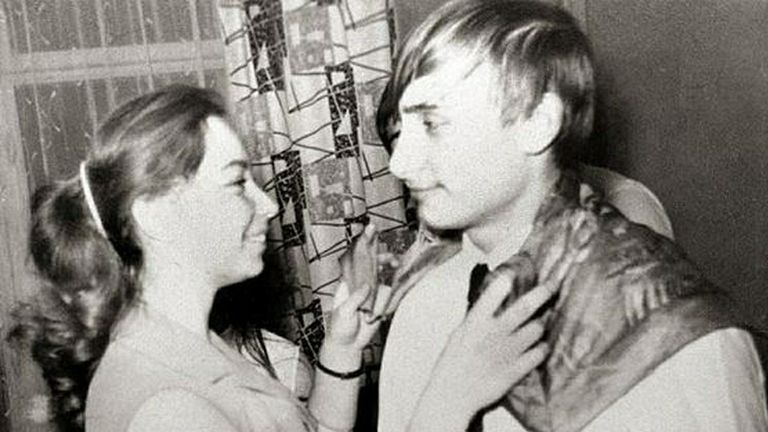
Vladimir Putin dances with a classmate at a party in St Petersburg in 1970
Working for the KGB: Stealing NATO secrets in East Germany
After graduating from Leningrad State University in 1975, he immediately joined the Soviet intelligence service – better known as the infamous KGB.
“I was driven by high motives. I thought I would be able to use my skills to the best for society,” the Washington Post reported him saying in 2000.
He was posted to Dresden in 1985, where he looked for East Germans who had plausible reasons to travel abroad and then recruited them to help spy on the West.
Unconfirmed reports also have Mr Putin working in New Zealand in the 1980s.
During his time in the KGB, he worked as a case officer and reached the rank of lieutenant colonel.
Mr Putin was recalled to Leningrad in 1990 as part of the KGB’s “active reserve”, as the USSR was on the verge of collapse.
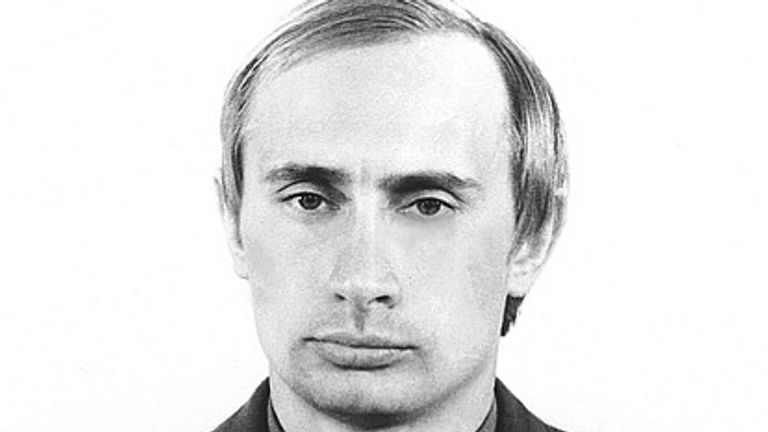
Vladimir Putin in KGB uniform
Head of the FSB and Yeltsin’s favourite
He became an adviser to one of his former law professors, Anatoly Sobchak, who eventually left to become chairman of Leningrad’s city council and later the city’s first democratically elected mayor.
Mr Putin became widely known as “Sobchak’s fixer” and rumours swirl around some of his activities during this time in St Petersburg.
In 1996 he moved to Moscow and started work in the Kremlin, where he was eventually appointed head of Russia’s Federal Security Service (FSB) – the successor to the KGB – in 1998.
Barely a year later he was named one of Russia’s first deputy prime ministers and then acting prime minister by President Boris Yeltsin.
When President Yeltsin resigned he was made acting president and officially elected president in March 2000.
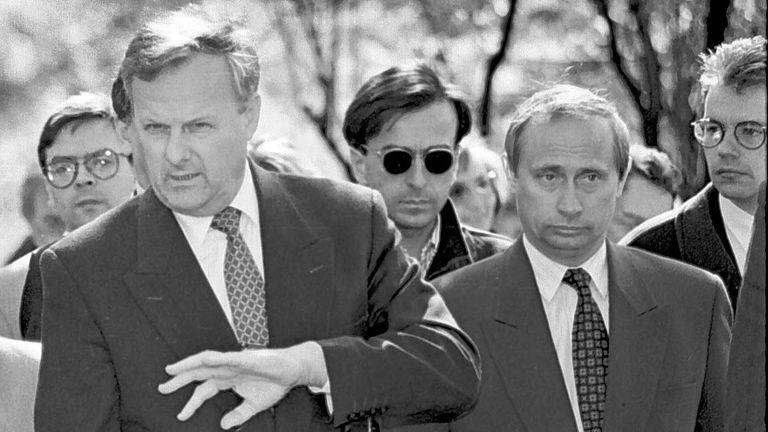
Vladimir Putin with Anatoly Sobchak in 1994
Kursk submarine disaster
Just months into his premiership, President Putin was criticised for his handling of the Kursk submarine disaster.
The nuclear-powered Kursk submarine sank on 12 August 2000 in a catastrophe that claimed the lives of all 118 crew and caused an international outcry.
Mr Putin initially elected to continue a holiday in Sochi and let days go by before accepting international assistance.
By the time British and Norwegian divers finally opened a hatch on board the submarine where survivors had been holding out, seven days had passed and nobody was left alive.
Read more:
What next for Ukraine? It’s all about America
Navalny’s widow accuses Putin of ‘fake’ faith
Moscow theatre hostage crisis
On 23 October 2002, 40 Chechen militants led by Movsar Barayev took 912 hostages at the Dubrovka Theatre in Moscow.
Three days later special forces were sent in to resolve the situation after an unknown gas was pumped into the hall and all the militants were killed, along with 130 hostages including foreigners.
The attack led to President Putin taking harsher measures against Chechen separatists.
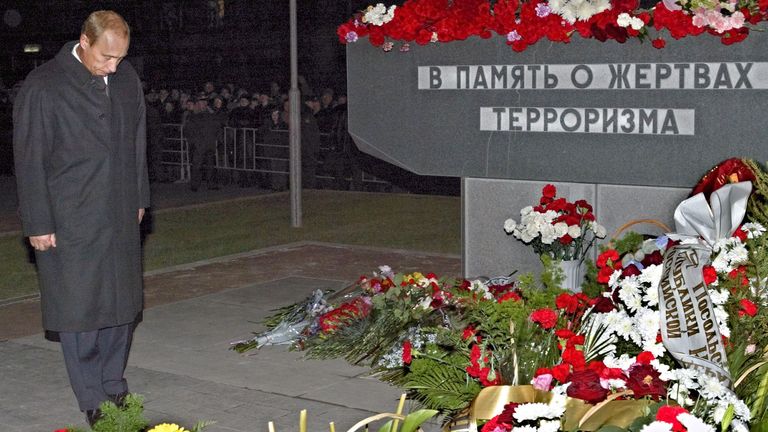
President Putin visits at the memorial to the Moscow Theatre Attack
Killing of journalist Anna Politkovskaya
On 7 October 2006 – President Putin’s birthday – journalist Anna Politkovskaya was shot in the lobby of her apartment building.
Before her death, she had exposed corruption in the Russian army and its conduct in Chechnya.
Her killing led to claims that President Putin had not done enough to protect the media.
He described the murder as “abominable in its cruelty” and commented that her death caused more problems for the Kremlin than her work.
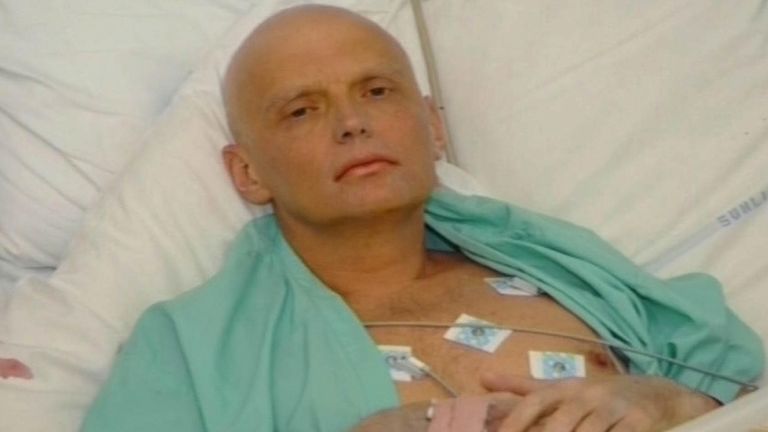
Alexander Litvinenko in hospital. Pic: Dreamscanner/Kobal/Shutterstock
Death of Alexander Litvinenko
In November 2006, a former KGB agent who went on to work for MI6 after fleeing to the UK fell ill after meeting two fellow ex-KGB agents at a hotel in London.
Alexander Litvinenko, a British citizen, had been a vocal critic of President Putin.
He died an agonising death after being poisoned with tea laced with Polonium 210, a rare and very potent radioactive isotope.
From his deathbed, he accused President Putin of ordering his killing, but the Kremlin has always denied any role.
Switching with Dmitry Medvedev
In 2008, when his second term as premier was coming to an end, President Putin faced the problem of the Russian constitution barring anyone from serving three consecutive terms.
Instead, first deputy prime minister Dmitry Medvedev was elected president and immediately appointed Mr Putin as prime minister, leading to the assumption that power had not really changed hands.
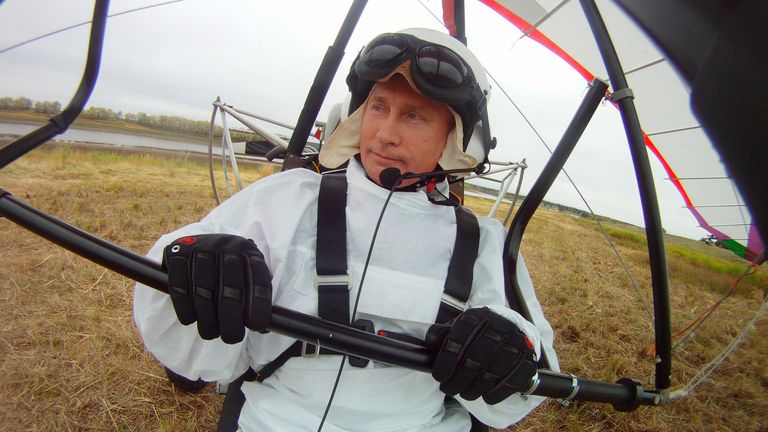
In 2011, with Mr Putin once again seeking re-election as president, tens of thousands of people took to the streets to protest against alleged electoral fraud.
In March 2012 he was indeed re-elected as president with 63.6% of the vote in an election marred by allegations of fraud.
Annexation of Crimea
In February 2014, a number of military bases in Crimea including the Ukrainian Navy’s headquarters in the Black Sea port of Sevastopol were seized by pro-Russian forces.
President Putin then signed a treaty to annex the peninsula to Russia following a referendum criticised as illegal by Ukraine and condemned internationally.
Similar scenes played out in other areas of eastern Ukraine, where pro-Russian forces took control in the so-called Donetsk and Luhansk People’s Republics amid the start of the Russo-Ukrainian War.
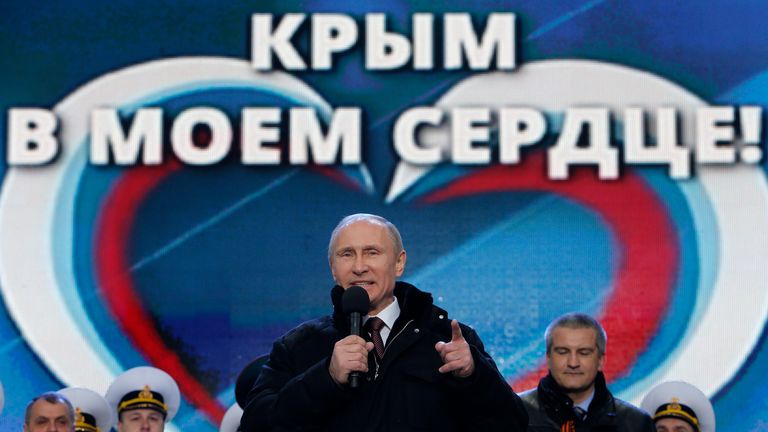
President Putin addresses the audience during a rally to support the annexation of Ukraine’s Crimea to Russia
Intervention in Syria
In September 2015, Mr Putin involved Russia in another conflict abroad, this time helping his ally President Bashar Al-Assad in the Syrian Civil War.
Russian forces conducted air and missile strikes and sent in special forces as part of the effort to crush resistance to the Syrian government.
The actions of Russian troops in Syria have been condemned and accusations of atrocities have been rife.
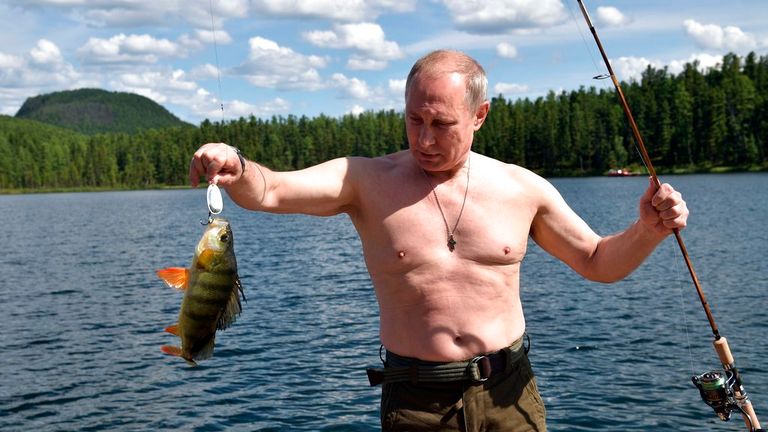

Poisonings on the streets of Britain
In March 2018 a former Russian spy was once again the target of an assassination attempt using a niche poison on the streets of Britain.
Sergei Skripal and his daughter Yulia were poisoned with the Soviet-designed nerve agent novichok and found slumped on a bench in Salisbury.
They were admitted to hospital in critical condition and were later discharged.
Fingers were immediately pointed at Russia. The Kremlin has always denied being behind the attack.

Sergei and Yulia Skripal were attacked with novichok
Who was Alexei Navalny?
A defining thread of President Putin’s premiership has been his efforts to crush opposition, in particular his struggle with vocal critic and opposition leader Alexei Navalny.
The anti-corruption activist organised demonstrations against the government and President Putin, who refused to refer to Mr Navalny by name.
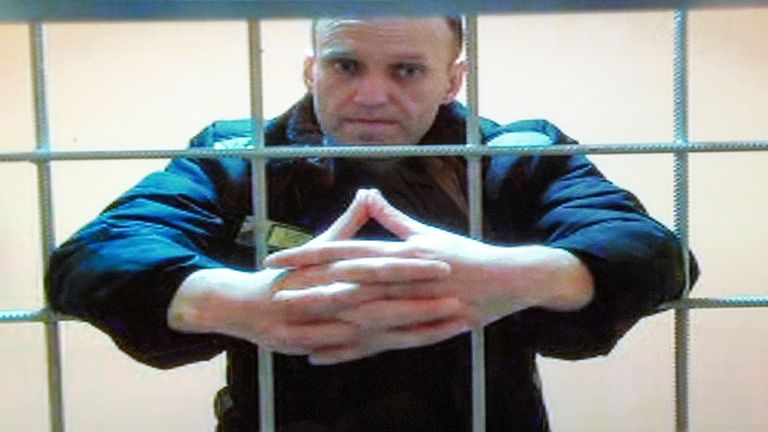
Alexei Navalny pictured in prison in May 2022. Pic: AP
In August 2020 he collapsed while onboard a domestic flight in Russia and the plane had to be diverted to another airport in Siberia.
After recovering in Germany he levelled blame at Russia’s intelligence services and the Kremlin itself.
Despite calls to stay away, he returned to Russia to continue his fight and was later imprisoned on dubious charges.
In February 2024 news that supporters of Mr Navalny had long feared emerged: the prominent opposition leader had died in prison.
The Kremlin has denied any involvement but the death raised eyebrows and suspicions of foul play remain.
Full scale invasion of Ukraine – and a prolonged war
In February 2022, after weeks of a build-up of Russian forces along the borders of Ukraine, President Putin gave the order to invade his neighbour in what he called a “special military operation”.
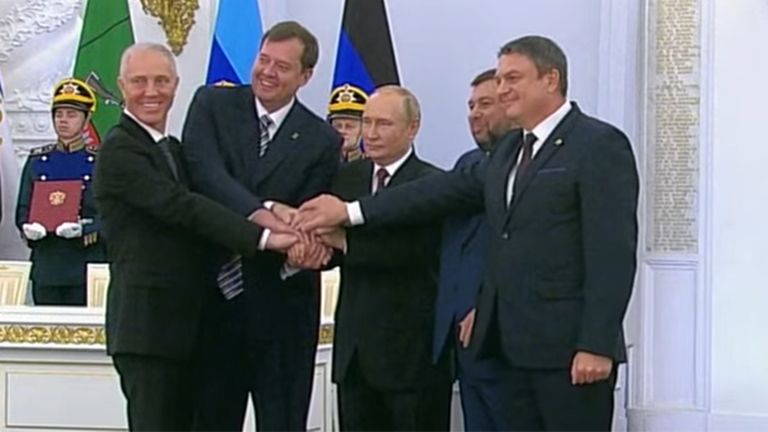
President Putin shakes hands with leaders of annexed regions of Ukraine
Hopes of a swift three-day war and the fall of Kyiv were quickly dashed as fierce Ukrainian resistance halted Russian troops and Western weapons flowed in.
The war has dragged on for more than two years, with no end in sight despite huge numbers of Russian casualties.
At the 2024 elections in March 2024, President Putin won another six-year term without serious challenge.
The highest profile anti-war politician inside Russia, Boris Nadezhdin, was barred from standing in the election.


